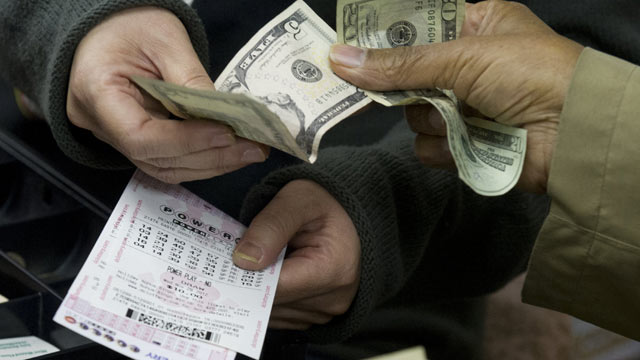The lucky winners of half of the record $587.5 million Powerball jackpot have been identified as Mark and Cindy Hill of Dearborn, Mo., their working-class lives suddenly taking a turn to the financial stratosphere.
Cindy Hill, who with her husband has three adult sons and a 6-year-old daughter adopted from China, purchased the ticket at a Trex Mart gas station in Dearborn.
"I called my husband and told him, 'I think I am having a heart attack,'" Cindy Hill, 51, said, according to the Missouri Lottery. "I think we just won the lottery!"
Cindy, who worked as an office manager but was laid off in 2010, said that when she learned that a winning ticket was sold in Missouri, she dropped her daughter off at school, went to a convenience store for a winning numbers report, and checked her tickets in her car, according to the Missouri State Lottery.
"I was just telling my daughter the night before, 'Honey, that probably never happens (people winning)," Cindy said. "It's really going to be nice to spend time – not have to work – and be able to take trips with our family."
Cindy did mention that her husband has mentioned one extravagance -- a red Camaro, but today he said that he plans on keeping his same old pick-up truck.
The winning ticket was one of five Cindy purchased, for a total of $10. She let the computer quick-pick choose the numbers, according to the Missouri Lottery. As soon as she saw that she had a winning ticket, Cindy had her mother-in-law and husband double check it.
"You know it's the Show Me State, so he said, 'Show me,'" she said.
Appearing at a press conference today in Dearborn along with their three sons, aged 28, 30, 31, and their 6-year-old daughter, the Hills appeared overjoyed.
"We were blessed before we ever won this," Cindy said. "We want to go back to China, Ireland of course -- we're Irish, and wherever the win takes us."
Cindy said that she bought the winning ticket Wednesday at about 4:45 p.m.
"I stuck it in my car, and it stayed there all night," she said. "Now that I know that it was a winner I wouldn't have done that!"
Powerball Winners: Did Missouri Man Play Baseball Jersey Numbers? Watch Video
Powerball Winners: Was Arizona Winner Caught on Surveillance? Watch Video
Powerball Winners: Video Out of Possible Winners Watch Video
The Hills will take home $193,750,000 in lump sum payout -- which works out to $396,000 for each person in Dearborn, a town of 496.
The couple say that they will remain in Dearborn, and plan on launching a scholarship at the local high school.
Speculation began running wild in the small town when 52-year-old Hill, a factory worker, updated his Facebook account late Thursday, writing, "We are truly blessed, we are lucky winners of the Powerball."
Within hours, his family began celebrating, telling ABC News Hill is one of the two big winners.
"Just shocked. I mean, I thought we were all going to have heart attacks," Hill's mother, Shirley, said Thursday.
Hill's mother says her son and his wife have been struggling financially. Hill works in a hot dog and deli packaging factory, but it was unclear whether he showed up for work Thursday night.
"I'm very happy for him. He's worked hard in his life; well, not anymore," Hill's son Jason said. "Well, I hope we all stay very grounded, stay humble and don't forget who we are."
Missouri Lottery official Susan Goedde confirmed to ABC News Thursday that one of the winning tickets was purchased at a Trex Mart in Dearborn, about 30 miles north of Kansas City.
The winning numbers were 5, 23, 16, 22 and 29; Powerball was 6.
Hill did not respond to ABC News' requests for comment.
Meanwhile, employees and customers at Marlboro Village Exxon in Upper Marlboro, Md., said a tall, black, bald man held the winning ticket purchased in Arizona, according to ABC News affiliate WJLA-TV.
Surveillance cameras at the Upper Marlboro gas station captured the apparent winner walking into the store Thursday afternoon, digging into his chest pocket for his lottery tickets. After a few seconds of scanning the wad of tickets, the man began jumping up and down, pumping his arms.
The man gave the tickets to store manager Nagassi Ghebre, who says the six Powerball numbers were on the ticket, which the apparent winner said he bought in Arizona.
"And then he said, 'I got to get out of here,'" employee Freddie Lopez told WJLA.
But before leaving, the possible winner felt the need to check again to see whether he really had the ticket that millions of Americans dreamed of having.
"He says, 'Is this the right number? I don't know.' And I said, 'Yeah that's the numbers. You got them all,'" customer Paul Gaug told WJLA.
Employees and customers said the main stuck around for a few more seconds shouting, "I won," before leaving.
"He came back a minute later and said, 'I forgot to get my gas. What am I thinking?'" Lopez said.
The man drove out of the gas station in a black car and on a full tank of gas with a cash payout of $192.5 million coming his way.
"He said he lives in Maryland. I'm pretty sure," Gaug said.
The possible jackpot winner was wearing bright neon clothing and store employees told WJLA that he appeared to be a highway or construction worker.
Arizona lottery officials told WJLA that if the man does have the winning ticket, it needs to be redeemed within 180 days of the drawing in Arizona.










